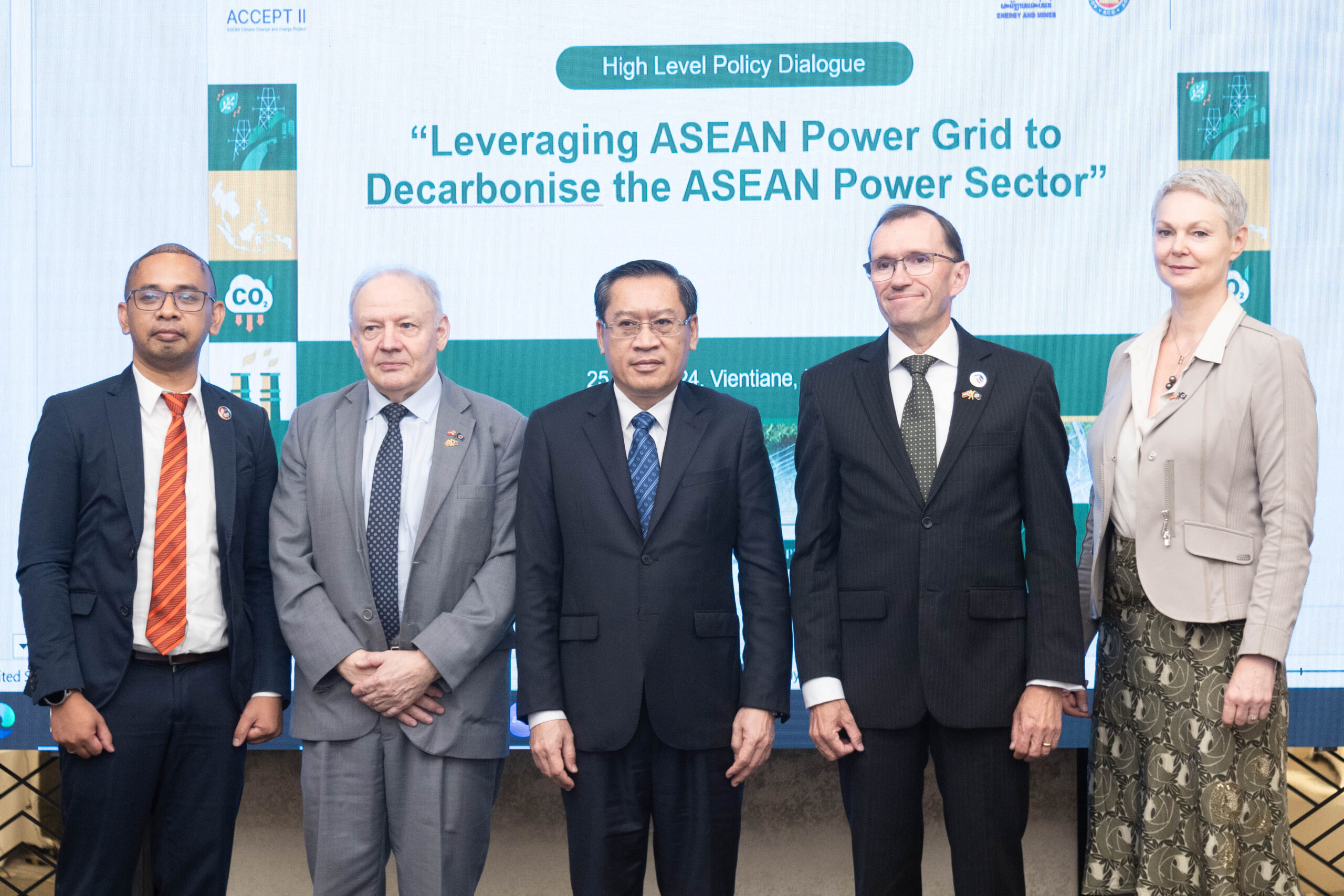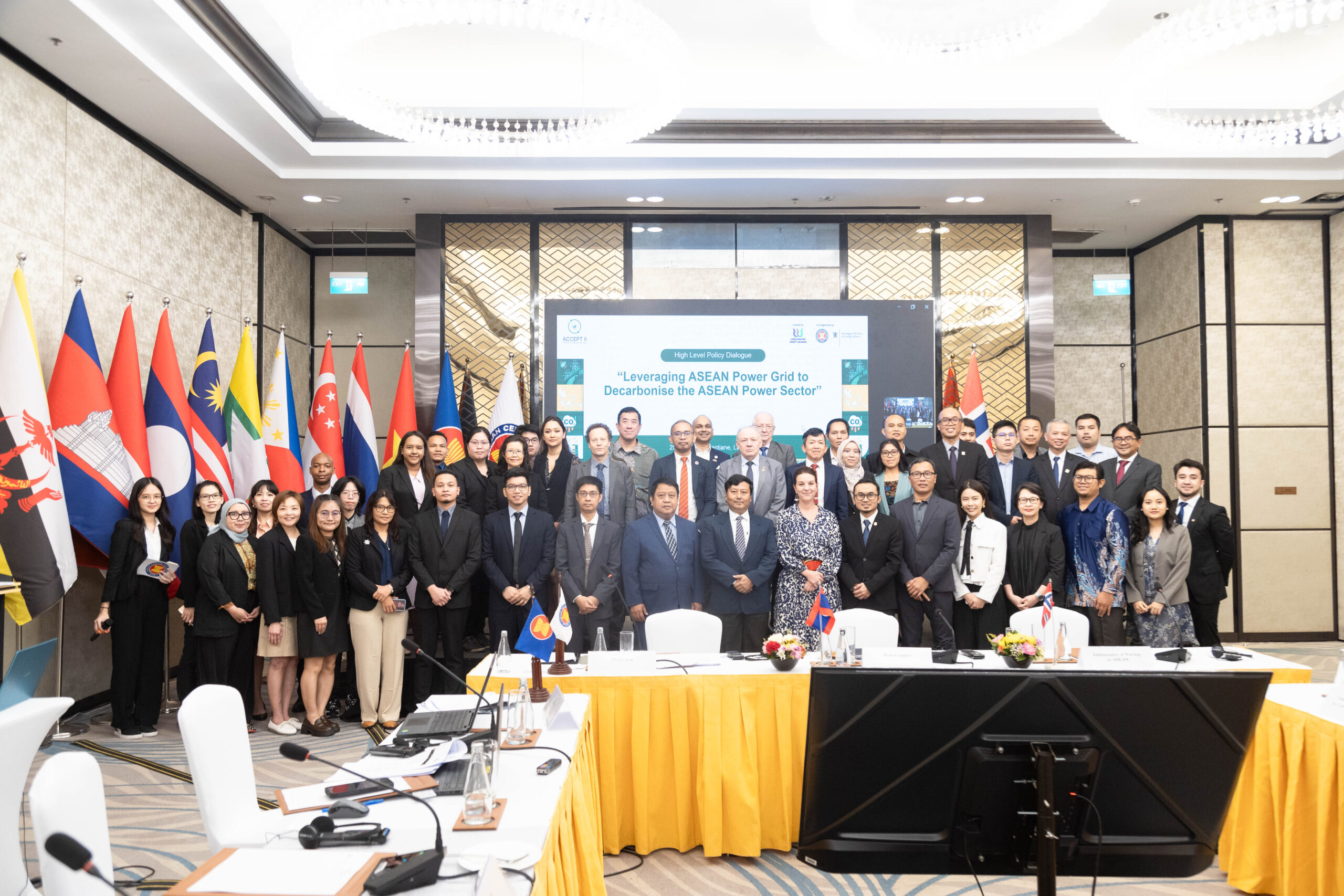Menu

Photo 1. (left to right) Beni Suryadi, Project Manager of ACCEPT II, H.E. Kjell Tormod Pettersen, Ambassador Norway to ASEAN, H.E. Phosay Sayasone, Minister of Energy and Mines, Lao PDR, H.E. Espen Barth Eide Minister of Foreign Affairs of Norway, and H.E. Hilde Solbakken, Ambassador Norway to Vietnam and Lao PDR.
Vientiane, 26 July 2024 – The ASEAN Centre for Energy (ACE), through the ASEAN Climate Change and Energy Project Phase II (ACCEPT II), organised back-to-back High-Level Policy Dialogues (HLPD) and followed by a Regional Workshop in Vientiane, Lao PDR on 25-26 July 2024, aimed at aligning regional policies towards a low-carbon economy and leveraging the ASEAN Power Grid (APG) to decarbonise the ASEAN power sector.
The HLPD on “Leveraging the ASEAN Power Grid to Decarbonise the ASEAN Power Sector,” was co-organised with the Norwegian Ministry of Foreign Affairs and the Norwegian Institute for International Affairs (NUPI) as a key event supporting Lao PDR’s ASEAN Chairmanship theme of ‘Enhancing Connectivity and Resilience.’ The dialogue highlighted the importance of the APG in facilitating regional electricity trading, integrating renewable energy, and achieving carbon neutrality across ASEAN.
The ASEAN Power Grid (APG) is one of the programme areas under the ASEAN Plan of Action for Energy Cooperation (APAEC). In his keynote address, H.E. Espen Barth Eide, Minister of Foreign Affairs of Norway, stated, “Norway is committed to supporting ASEAN’s energy transition. The ASEAN Power Grid offers significant potential for reducing carbon emissions and enhancing energy security through regional cooperation and the integration of hydropower and other renewable sources. ACCEPT II plays a vital role in driving these initiatives forward.”
High-level delegates of the HLPD engaged in comprehensive discussions on advancing the APG, addressing technical challenges like grid modernisation and stability, and exploring infrastructure upgrades for renewable energy flow and reliability. They focused on creating coherent policies and harmonised regulations across ASEAN for seamless APG deployment and multilateral electricity trading. Financial mechanisms such as green bonds and renewable energy certificates were discussed to attract investment in large-scale renewable projects. Emphasis was placed on enhancing regional cooperation and knowledge-sharing, with calls for intergovernmental collaboration to achieve climate goals and sharing best practices from pilot projects and electricity trading experiences.

Photo 2. All participants of High Level Policy Dialogues on Leveraging the ASEAN Power Grid to Decarbonise the ASEAN Power Sector
H.E. Phosay Sayasone, Minister of Energy and Mines, Lao PDR, remarked, “Hosting these significant events highlights Lao PDR’s role in supporting regional efforts towards a sustainable and low-carbon future. ACE’s role in facilitating regional cooperation and driving the ASEAN Power Grid and low-carbon initiatives is crucial to achieving our climate and energy goals.”
The HLPD on “Aligning Policies Towards Low Carbon Economy in the Next ASEAN Regional Energy Blueprint” brought discussion on the strategic alignment of national and regional policies for a low-carbon future. The dialogue focused on priorities for the ASEAN Energy Cooperation Strategies Post 2025, the dialogue also explored the cross-collaboration between sectors in ASEAN in mitigating climate change, including energy and climate sector.

Photo 3. H.E. Sujiro Seam, EU Ambassador to ASEAN, with all participants of High Level Policy Dialogue on Aligning Policies Towards Low Carbon Economy in the Next ASEAN Regional Energy Blueprint and Regional Workshop on Advancing Low-Carbon Energy Transition to Support the Next ASEAN Regional Energy Blueprint
Supported by the European Union, the Regional Workshop on “Advancing Low-Carbon Energy Transition to Support the Next ASEAN Regional Energy Blueprint” gathered delegates from across the ASEAN region to discuss the integration of climate change strategies into the APAEC 2026-2030. The workshop focused on financing opportunities for low-carbon technologies, adopting clean and emerging technologies, and improving communication and knowledge-sharing between energy and climate sectors. Delegates shared best practices and lessons learned, aiming to build capacity and strengthen regional collaboration to drive the low-carbon energy transition. This platform facilitated in-depth discussions on practical steps to support ASEAN’s low-carbon energy goals and informed the development of the next regional energy blueprint.
Beni Suryadi, Head of the Power, Fossil Fuels, Alternative Energy, and Storage (PFS) Department and Sustainable and Renewable Energy (SRE) Department at ACE & Project Manager of ACCEPT II, commented on the energy-climate focused HLPD and Regional Workshop. He stated, “The ACCEPT II initiative shows our commitment to driving ASEAN’s energy transition. By fostering high-level dialogues and regional workshops, we are not only creating a platform for policy discussions but also developing concrete action plans that align with our regional goals. These initiatives that we have today are critical steps towards achieving a sustainable and low-carbon future for the ASEAN region. ACE remains dedicated to supporting member states in harmonising energy and climate policies and enhancing regional cooperation to realise our shared climate objectives.”
***
About ASEAN Centre for Energy (ACE)
Established on 1 January 1999, the ASEAN Centre for Energy (ACE) is an intergovernmental organisation within the Association of Southeast Asian Nations’ (ASEAN) structure that represents the 10 ASEAN Member States’ (AMS) interests in the energy sector. ACE supports the implementation of the ASEAN Plan of Action for Energy Cooperation (APAEC), a blueprint for ASEAN energy sector. The Centre is guided by a Governing Council composed of Senior Officials on Energy from each AMS and a representative from the ASEAN Secretariat as an ex-officio member.
The three key roles of ACE:
Keeping the region’s improvement, sustainable and harmless to the ecosystem is a fundamental concern of the ASEAN energy sector. Hosted by the Ministry of Energy and Mineral Resources of Indonesia, ACE’s office is located in Jakarta, Indonesia. For more information on ACE website: aseanenergy.org.
For further information, please contact:
Communications at ACE: [email protected]
About ASEAN Climate Change and Energy Project Phase II (ACCEPT II)
The ASEAN Climate Change and Energy Project (ACCEPT) Phase 2 is a collaboration between the ASEAN Centre for Energy (ACE) and the Norwegian Institute of International Affairs (NUPI) is funded by the Norwegian Government, under the Norwegian-ASEAN Regional Integration Programme (NARIP). The 48-month project officially began on 1 November 2022 as a continuation of ACCEPT Phase 1.
One of the key objectives of ACCEPT II is to support the implementation of the ASEAN Plan of Action for Energy Cooperation (APAEC) Programme Area No. 6, Regional Energy Policy and Planning, Outcome-based Strategy (OBS) 6, “Promote Information Sharing on the Energy-Climate Nexus”, which was initiated by ACCEPT Phase 1.
ACCEPT II supports the ASEAN Member States in transitioning to a low-carbon energy system and achieving carbon neutrality. The project enhances ACE’s governance effectiveness on climate-related energy issues, promotes gender equality, and advances knowledge, capacity building, and regional collaboration on the energy-climate nexus.
For media inquiries, please contact:
[email protected]
Communications Team
Corporate Affairs Department
